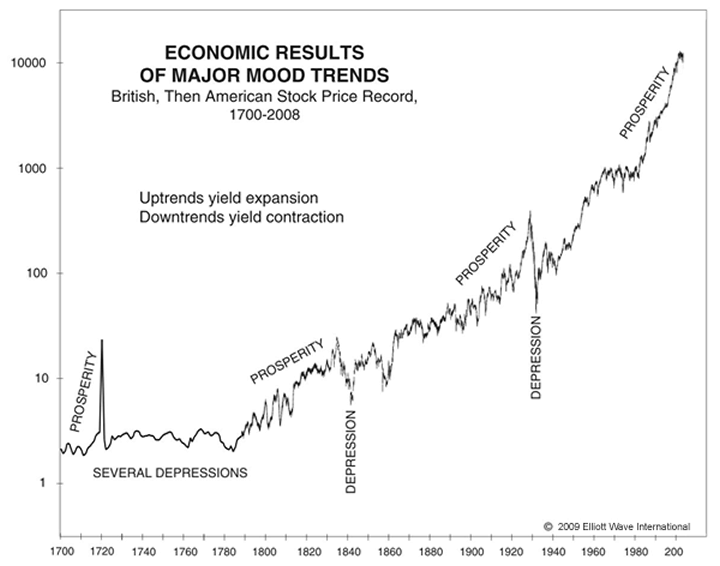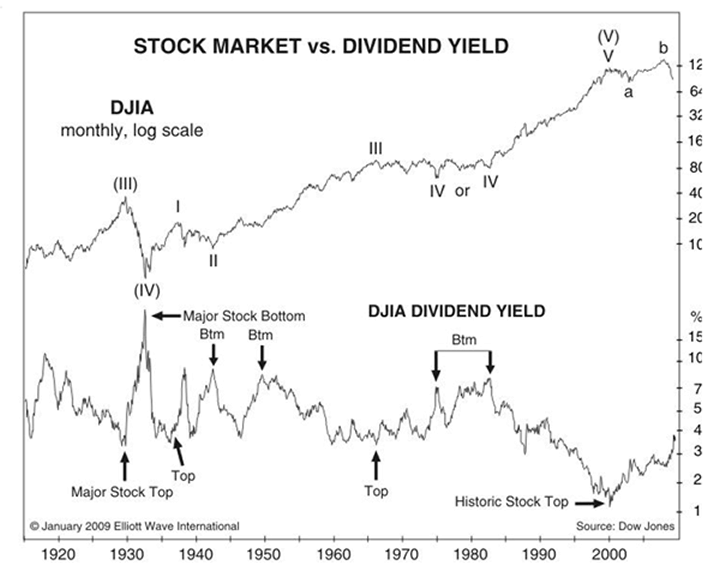Stocks Bear Market and Depression: How Close to the Bottom?
Stock-Markets / Stocks Bear Market Jul 12, 2010 - 05:49 PM GMTBy: EWI
 While many people spend time yearning for the financial markets to turn back up, a rare few have looked back in time to compare historical markets with the current situation -- and then delivered a clear-eyed view of the future informed by knowledge of the past. One who has is Robert Prechter. When he thinks about markets and wave patterns, he goes back to the 1700s, the 1800s, and -- most tellingly for our time now -- the early 1900s when the Great Depression weighed down the United States in the late 1920s and early 1930s. With this large wash of history in mind, he is able to explain why he thinks we have a long way to go to get to the bottom of this bear market.
While many people spend time yearning for the financial markets to turn back up, a rare few have looked back in time to compare historical markets with the current situation -- and then delivered a clear-eyed view of the future informed by knowledge of the past. One who has is Robert Prechter. When he thinks about markets and wave patterns, he goes back to the 1700s, the 1800s, and -- most tellingly for our time now -- the early 1900s when the Great Depression weighed down the United States in the late 1920s and early 1930s. With this large wash of history in mind, he is able to explain why he thinks we have a long way to go to get to the bottom of this bear market.
Here is an excerpt from the EWI Independent Investor eBook, which answers the question: How close to the bottom are we? * * * * * Originally written by Robert Prechter for The Elliott Wave Theorist, January 2009
Some people contact us and say, “People are more bearish than I have ever seen them. This has to be a bottom.” The first half of this statement may well be true for many market observers. If one has been in the market for less than 14 years, one has never seen people this bearish. But market sentiment over those years was a historical anomaly. The annual dividend payout from stocks reached its lowest level ever: less than half the previous record. The P/E ratio reached its highest level ever: double the previous record. The price-to-book value ratio went into the stratosphere, as did the ratio between corporate bond yields and the same corporations’ stock dividend yields.
During nine and a half of those years, from October 1998 to March 2008, optimism dominated so consistently that bulls outnumbered bears among advisors (per the Investors Intelligence polls) for 481 out of 490 weeks. Investors got so used to this period of euphoria and financial excess that they have taken it as the norm.
With that period as a benchmark, the moderate slippage in optimism since 2007 does appear as a severe change. But observe a subtle irony: When commentators agree that investors are too bearish, they say so to justify being bullish. Thus, as part of the crowd, they are still seeking rationalizations for their continued optimism, and one of their best excuses is that everyone else is bearish. This would be reasoning, not rationalization, if it were true.
But is the net reduction in optimism since 2000/2007 in fact enough to indicate a market bottom? For the rest of this issue, we will update the key indicators from Conquer the Crash that so powerfully signaled a historic top in the making. When we are finished, you will know whether or not the market is at bottom.

Figure 1 updates our picture of Supercycle and Grand Supercycle-degree periods of prosperity and depression. The top formed in the past decade is the biggest since 1720, yet, as you can see, the decline so far is small compared to the three that preceded it. There is a lot more room to go on the downside.

Figure 2 updates the Dow’s dividend yield. Over the past nine years, it has improved nicely, from 1.3 percent to 3.7 percent, near its level at previous market tops. If companies’ dividends were to stay the same, a 50 percent drop in stock prices from here would bring the Dow’s yield back into the area where it was at the stock market bottoms of 1942, 1949, 1974 and 1982. But of course, dividends will not stay the same.
Companies are cutting dividends and will cut more as the depression deepens. So, the falling stock market is chasing an elusive quarry in the form of an attractive dividend yield. This is a downward spiral that will not end until prices get ahead of dividend cuts and the Dow’s dividend yield goes above that of 1932, which was 17 percent (or until dividends fall so close to zero that the yield is meaningless).
Get the whole story about how much farther we have to go to a bear-market bottom by reading the rest of this article from EWI's Independent Investor eBook. The fastest way to read it AND the six new chapters in EWI's Independent Investor eBook is to become a member of Club EWI.
This article, The Bear Market and Depression: How Close to the Bottom?,was syndicated by Elliott Wave International. EWI is the world's largest market forecasting firm. Its staff of full-time analysts lead by Chartered Market Technician Robert Prechter provides 24-hour-a-day market analysis to institutional and private investors around the world.
About the Publisher, Elliott Wave International
Founded in 1979 by Robert R. Prechter Jr., Elliott Wave International (EWI) is the world's largest market forecasting firm. Its staff of full-time analysts provides 24-hour-a-day market analysis to institutional and private around the world.
© 2005-2022 http://www.MarketOracle.co.uk - The Market Oracle is a FREE Daily Financial Markets Analysis & Forecasting online publication.



